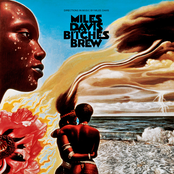Bitches Brew

Biography
Bitches Brew is a studio double album by jazz musician Miles Davis, released in April 1970 on Columbia Records. The album continued his experimentation with electric instruments previously featured on his critically acclaimed In a Silent Way album. With the use of these instruments, such as the electric piano and guitar, Davis rejected traditional jazz rhythms in favor of a looser, rock-influenced improvisational style. Bitches Brew was Davis's first gold record, selling more than half a millio...
Bitches Brew is a studio double album by jazz musician Miles Davis, released in April 1970 on Columbia Records. The album continued his experimentation with electric instruments previously featured on his critically acclaimed In a Silent Way album. With the use of these instruments, such as the electric piano and guitar, Davis rejected traditional jazz rhythms in favor of a looser, rock-influenced improvisational style. Bitches Brew was Davis's first gold record, selling more than half a million copies. Upon release, it received a mixed response, due to the album's unconventional style and revolutionary sound. Later, Bitches Brew gained recognition as one of jazz's greatest albums and a progenitor of the jazz rock genre, as well as a major influence on rock and funk musicians. The album won a Grammy Award for Best Large Jazz Ensemble Album in 1971. In 1998, Columbia Records released The Complete Bitches Brew Sessions, a four-disc box set that included the original album as well as the studio sessions through February 1970. Recording sessions took place at Columbia's 30th Street Studio over the course of three days in August 1969. Davis called the musicians to the recording studio on very short notice. A few pieces on Bitches Brew were rehearsed before the recording sessions, but at other times the musicians had little or no idea what they were to record. Once in the recording studio, the players were typically given only a few instructions: a tempo count, a few chords or a hint of melody, and suggestions as to mood or tone. Davis liked to work this way; he thought it forced musicians to pay close attention to one another, to their own performances, or to Davis's cues, which could change at any moment. On the quieter moments of "Bitches Brew", for example, Davis's voice is audible, giving instructions to the musicians: snapping his fingers to indicate tempo, or, in his distinctive whisper, saying, "Keep it tight" or telling individuals when to solo. Davis composed most of the music on the album. The two important exceptions were the complex "Pharaoh's Dance" (composed by Joe Zawinul) and the ballad "Sanctuary" (composed by Wayne Shorter). The latter had been recorded as a fairly straightforward ballad early in 1968, but was given a radically different interpretation on Bitches Brew. It begins with Davis and Chick Corea improvising on the standard "I Fall in Love too Easily" before Davis plays the "Sanctuary" theme. Then, not unlike Davis's recording of Shorter's "Nefertiti" two years earlier, the horns repeat the melody over and over while the rhythm section builds up the intensity. The issued "Sanctuary" is actually two consecutive takes of the piece. Despite his reputation as a "cool", melodic improviser, much of Davis's playing on this album is aggressive and explosive, often playing fast runs and venturing into the upper register of the trumpet. His closing solo on "Miles Runs the Voodoo Down" is particularly noteworthy in this regard. Davis did not perform on the short piece "John McLaughlin". There was significant editing done to the recorded music. Short sections were spliced together to create longer pieces, and various effects were applied to the recordings. Enrico Merlin reports: Bitches Brew also pioneered the application of the studio as a musical instrument, featuring stacks of edits and studio effects that were an integral part of the music. Miles and his producer, Teo Macero, used the recording studio in radical new ways, especially in the title track and the opening track, "Pharaoh's Dance". There were many special effects, like tape loops, tape delays, reverb chambers and echo effects. Through intensive tape editing, Macero concocted many totally new musical structures that were later imitated by the band in live concerts. Macero, who has a classical education and was most likely inspired by the 1930s and 1940s musique concrète experiments, used tape editing as a form of arranging and composition. "Pharaoh's Dance" contains 19 edits – its famous stop-start opening is entirely constructed in the studio, using repeat loops of certain sections. Later on in the track there are several micro-edits: for example, a one-second-long fragment that first appears at 8:39 is repeated five times between 8:54 and 8:59. The title track contains 15 edits, again with several short tape loops of, in this case, five seconds (at 3:01, 3:07 and 3:12). Therefore, Bitches Brew not only became a controversial classic of musical innovation, it also became renowned for its pioneering use of studio technology. /////////////////////////////////////////////////////////// Miles Davis trumpet Wayne Shorter ss, Bennie Maupin bcl, Joe Zawinul p Larry Young p, Chick Corea p, John McLaughlin g, Dave Holland b, Harvey Brooks electric bass Lenny White d, Jack DeJohnette d, Don Alias drums, congas Juma Santos shaker, congas Mati Klarwein's painting on the cover Released April 1970 - Recorded August 19-21.8. 1969 Producer Teo Macero, Columbia Read more on Last.fm. User-contributed text is available under the Creative Commons By-SA License; additional terms may apply.
